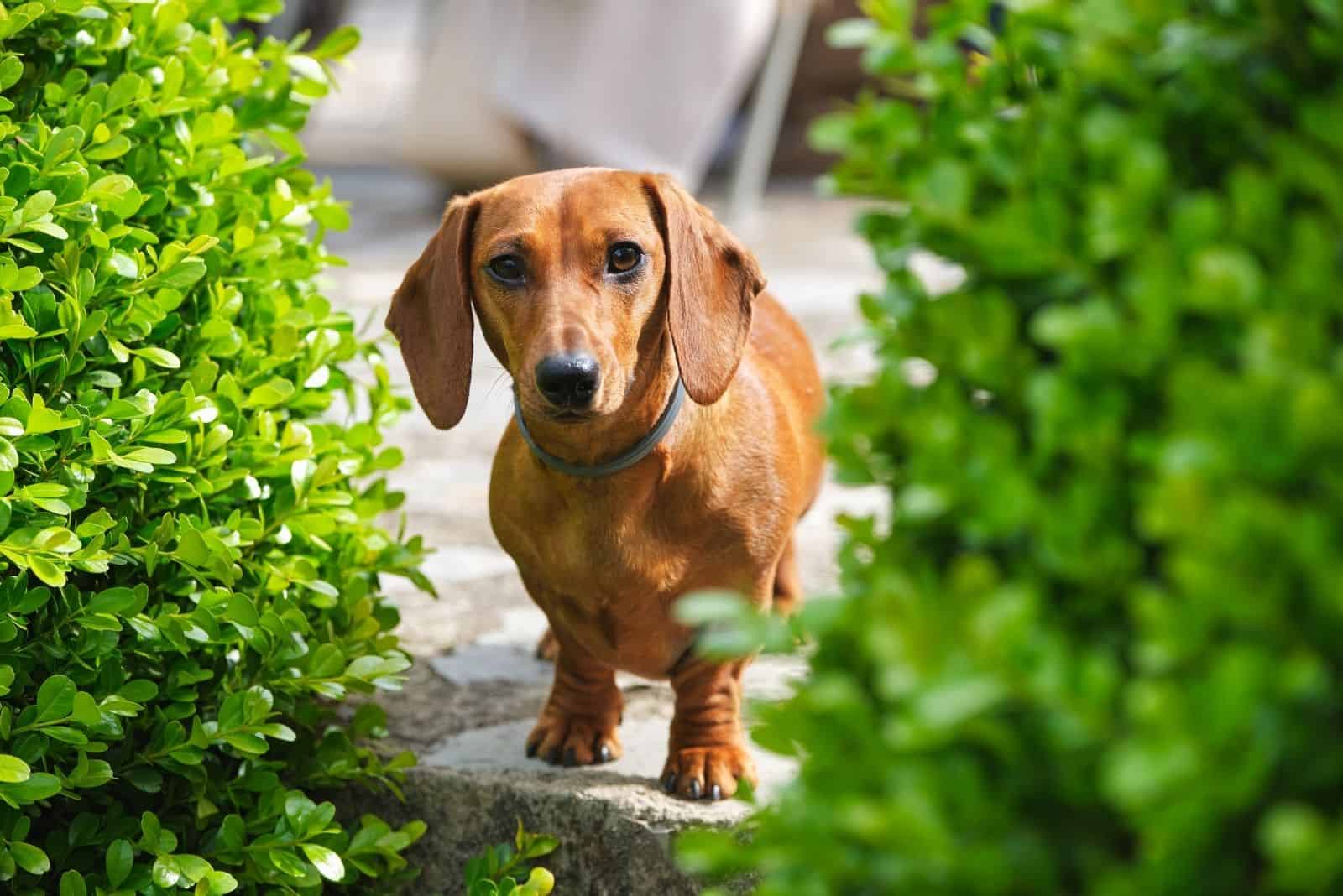Dachshunds might be small and cute, but they’ve got quite the temper. This dog breed comes in three varieties: smooth Dachshunds (short-haired), wirehaired Dachshunds, and longhaired Dachshunds.
In the United States, there are two varieties: miniature Dachshunds (11 pounds and under as an adult), and standard Dachshunds (usually between 16 and 32 pounds as an adult).
No matter what their size, Dachshunds can be excellent family dogs, which is why they have ranked near the top of most popular dog lists since the 1950s.
Their cute appearance and lively disposition have inspired many affectionate nicknames for the breed, including wiener dog, hot dog, sausage dog, Doxie, etc.
Dachshunds are brave, but they can be somewhat stubborn, and they have an independent spirit, especially when hunting.
There have been questions as to their potential aggression issues. They were bred to hunt badgers, so naturally, they are genetically predisposed to being aggressive.
Let’s find out what we know so far about aggressive Dachshunds.
Are Dachshunds Aggressive?
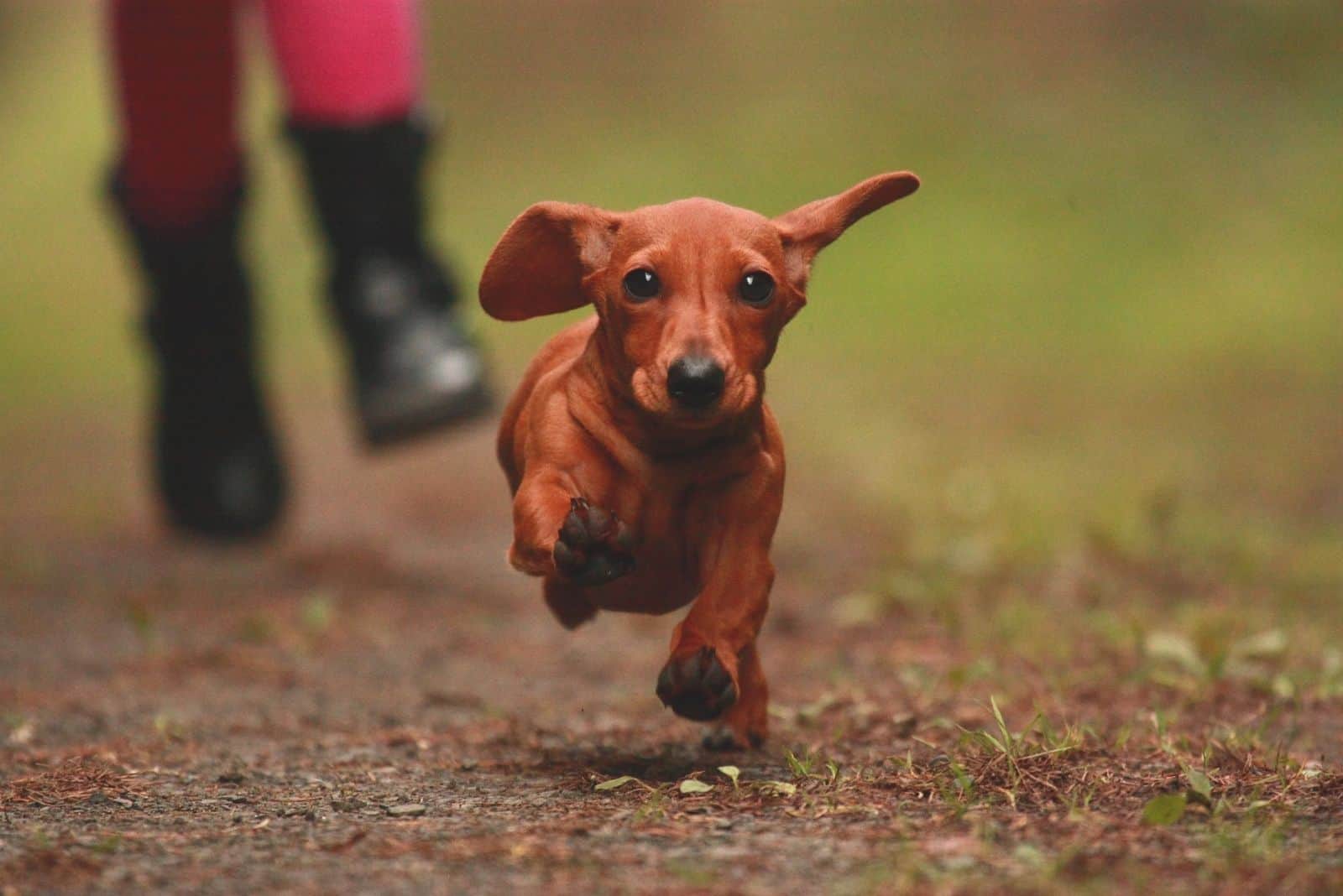
When people think about aggressive dogs, they usually have Pitbulls or Rottweilers on their mind. Very few of them will think that Beagles, Jack Russells, Labradors, or Retrievers are dangerous.
Dachshunds will probably be the last breed to come to your mind when talking about aggressive behavior.
Dachshunds are known for having an energetic, friendly, and loyal personality. They are also keen to guard their family members… they are very protective of their owners.
Sometimes, they forget exactly how small they are (just like Chihuahuas) and display the temperament of larger dogs.
So, are Dachshunds aggressive? No, they are not naturally aggressive dogs; they don’t belong to aggressive breeds.
However, a 2008 study by animal behavioral scientists at the University of Pennsylvania, published in the Journal of Applied Animal Behavior Science, paints the Dachshund as an aggressive breed.
It listed the Dachshund as the most aggressive breed towards strangers and other dogs. It also ranked them second at being aggressive towards their owners.
Before we continue, let’s make something clear. Problems in dogs are generally caused by people. Often, it is through lack of understanding or lack of consistency.
Every dog that is not properly socialized from a young age can show aggressive tendencies towards other dogs or people. Dachshunds are not an exception.
What Causes A Dachshund To Be Aggressive?
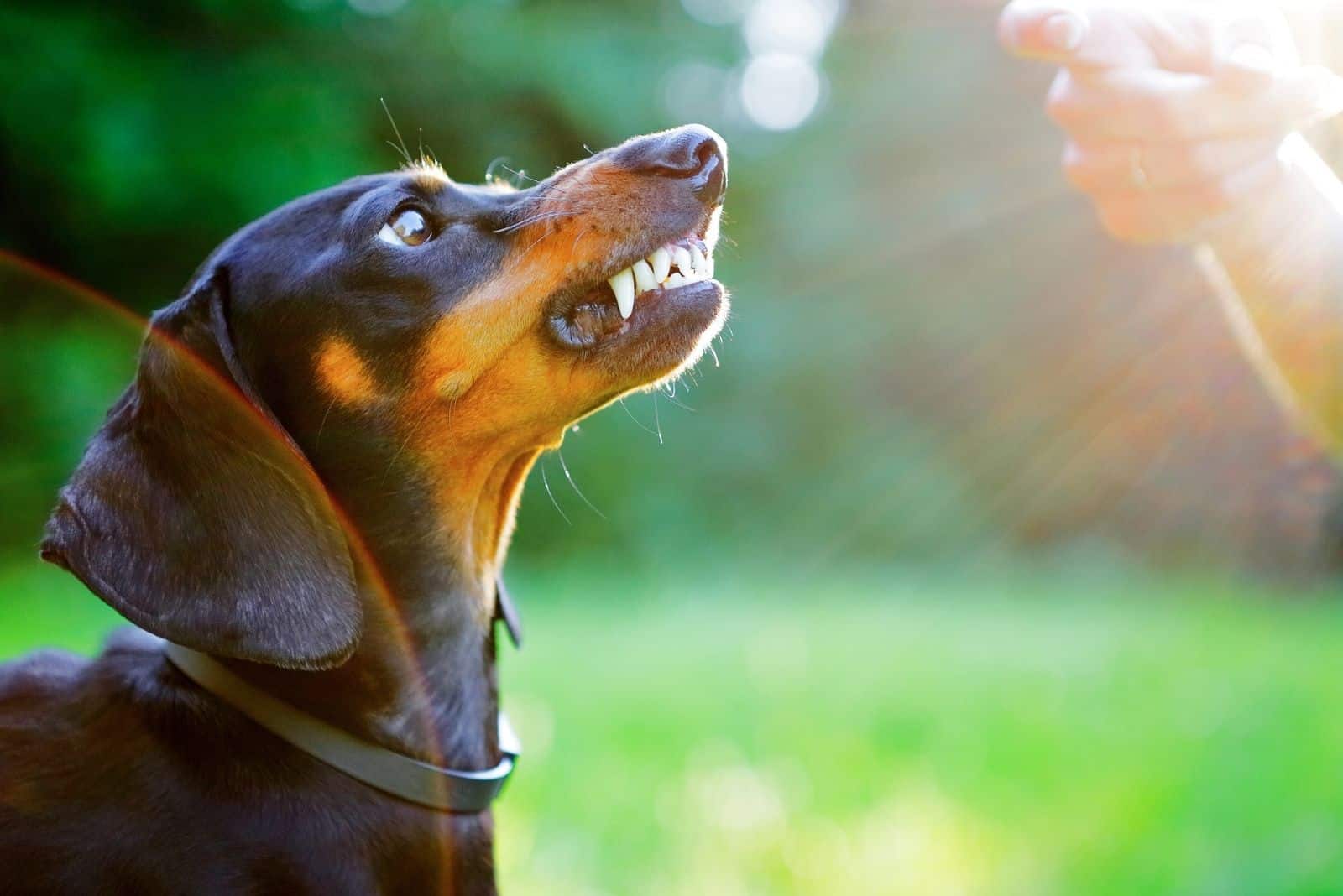
Dachshund aggression can start as early as six weeks old. Punishing, shouting, or hitting your Dachshund puppy at an early age when they don’t understand what they have done may lead to problems with aggression when they grow up.
When you notice early signs of aggression, you must address them before they become a problem that will be harder to deal with later. The most common factors that can make your Dachshund aggressive are:
• Fear
• Resource guarding
• Predatory instincts
• Boredom/anxiety
• Pain
• Dominance
• Territorial Aggression
Fear Aggression
At times, your Dachshund may act aggressive if he/she feels threatened. It is their way of protecting themselves.
Strangers, children, and other big dogs can pose a threat triggering defensive aggression in Dachshunds. Act calm around your dog to help him feel safe.
If your dog is frightened because of children or other pets, allow him to retreat to a safe place. Also, teach people, especially children, to treat your dog with kindness.
Resource guarding
Experienced dog owners as well as most people usually know that an animal should not be disturbed while they’re eating or enjoying a toy. Simply put, you never can anticipate how they will respond.
Some dogs are indifferent to being petted, interrupted, or accidentally bumped into during mealtime or playtime. However, others mind such disturbances very much.
Since Dachshunds were bred to hunt and kill their prey, they will do whatever it takes to protect their prey.
They need to have full control over whatever they are protecting, whether it’s their human, their food, or their toy. They may become upset if a person or other animal attempts to take their prized possession.
Predatory Instinct
The Dachshund’s predatory nature is visible in its interaction with other animals. While this dog might not be a great companion with smaller pets like hamsters or ferrets, it also doesn’t mind going up against big dogs.
Early socialization and obedience training are the only ways to help a Dachshund be comfortable in the company of other animals.
Boredom/Anxiety
Dogs are pack animals that thrive, and they need the companionship of other members. This is the primary reason why they make wonderful companions, and they like and need to be with their perceived pack.
This can also cause issues for them when they feel that they are separated from the pack (you) or are not getting enough attention.
If the dog is displaying unusual behavior while you’re at home, maybe even in the next room, then most likely, it is seeking attention.
Common issues related to boredom can be lunging at people, chewing, barking, pottying in the house, or just getting into things they’re not supposed to in attempts to get your attention.
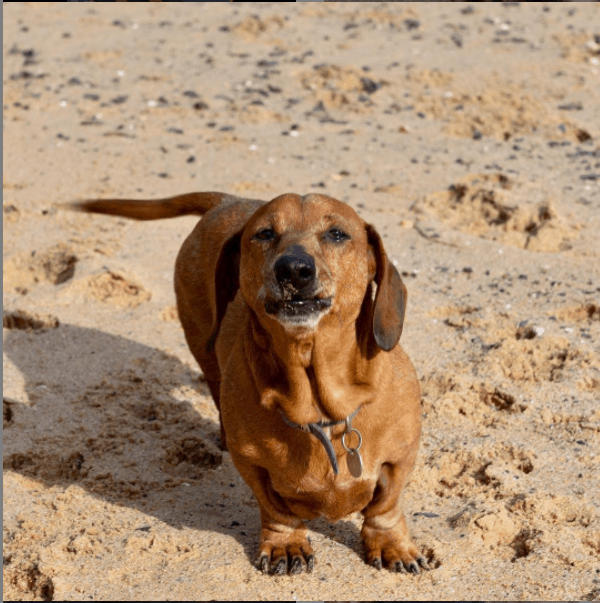
Photo from @abigail_jewellery_au
In this case, you need to add more activity to your dog’s time with you. Take them for a walk or play fetch or their favorite game.
Read More: How To Potty Train Dachshund Dog Breed: Explained
If, however, your dog follows you from room to room, and feels extremely distressed when it cannot get to you, such as needing to touch you often, then most likely, they are suffering from separation anxiety.
In extreme cases, they may exhibit destructive behavior, or even attempt to escape. They may even jump out or through windows, chase shadows or reflections, or chew on themselves in an attempt to resolve their anxiety.
In these cases, it is extremely important that you work to desensitize their extreme fear of being left alone.
Pain
Some Dachshunds can become aggressive when they are in pain or unwell.
So, if you really can’t see or know what is causing your Dachshund to suddenly behave aggressively, you may want to take him to the vet to see what is going on with your dog.
Dominance
Dachshunds were bred to hunt in packs, with the alpha leading from the front. This has led to an innate tendency in these dogs to try and dominate other individuals around it, whether they are animals or human family members.
From an early age, Dachshunds try to establish their dominance by baring their fangs, even during play.
In order to control dog aggression in this case, Dachshund owners should establish dominance over their small dogs from an early age. The owner must demonstrate to his dog that he is the pack leader.
Demonstrating dominance can be done in simple ways. For example, you (the owner) should be the first to walk into and out of the house, then your dog should follow.
Train your dog to walk on a loose leash and not pull ahead of you. Be a strong leader. Make your Dachshund obey a command before you give it food, attention, or toys.
If unchecked, this behavior can result in an adult dog that considers itself the master of its domain, prone to attacking another animal or a human if its dominance seems under threat.
Territorial Aggression
Perceived territory is something very important to any dog. It gives them a sense of boundary from which to call their own.
It is normal for a dog to exhibit signs of protecting their territory, like barking or alerting with a low growl, while laying on the couch and something or someone new enters their world.
With a dog, territory is any space that they feel belongs to them, be it the yard, the house, a kennel, or even your lap.
If your Dachshund feels like someone or something is intruding on its territory, it may behave aggressively to warn them off. The typical response to potential intruders is to bark. This, in itself, is the basis for most complaints about dogs.
Are Dachshunds Aggressive Towards People And Children?
Dachshunds are not naturally predisposed to being friendly to strangers, with the primary instinct being to protect their family.
As a result, they can be overprotective of you when people who the dog doesn’t know do anything they see as threatening. While this makes them excellent watchdogs, it can also be a risk to house guests or in public settings.
The breed is supposed to be suspicious towards strangers, but they should not be aggressive towards them.
What is often perceived as aggression is their natural protective and controlling instinct. This can still be a behavioral issue, but it should be dealt with differently.
When coming across strangers, a Dachshund that is not properly socialized will growl, bare its teeth, and bark. That’s why proper training and early socialization are very important.
Dachshunds aren’t generally aggressive towards children, again, as long as they’re properly socialized and the kids play nicely with them! Most Dachshunds make lovely family dogs and are great around children.
Always make sure you introduce your Dachshund properly to each child, and make sure the kids know the rules – no picking them up, squeezing them, disturbing them when they are eating or sleeping, petting them when they seem stressed, or playing boisterously around them.
Are Dachshunds Aggressive Toward Other Dogs?
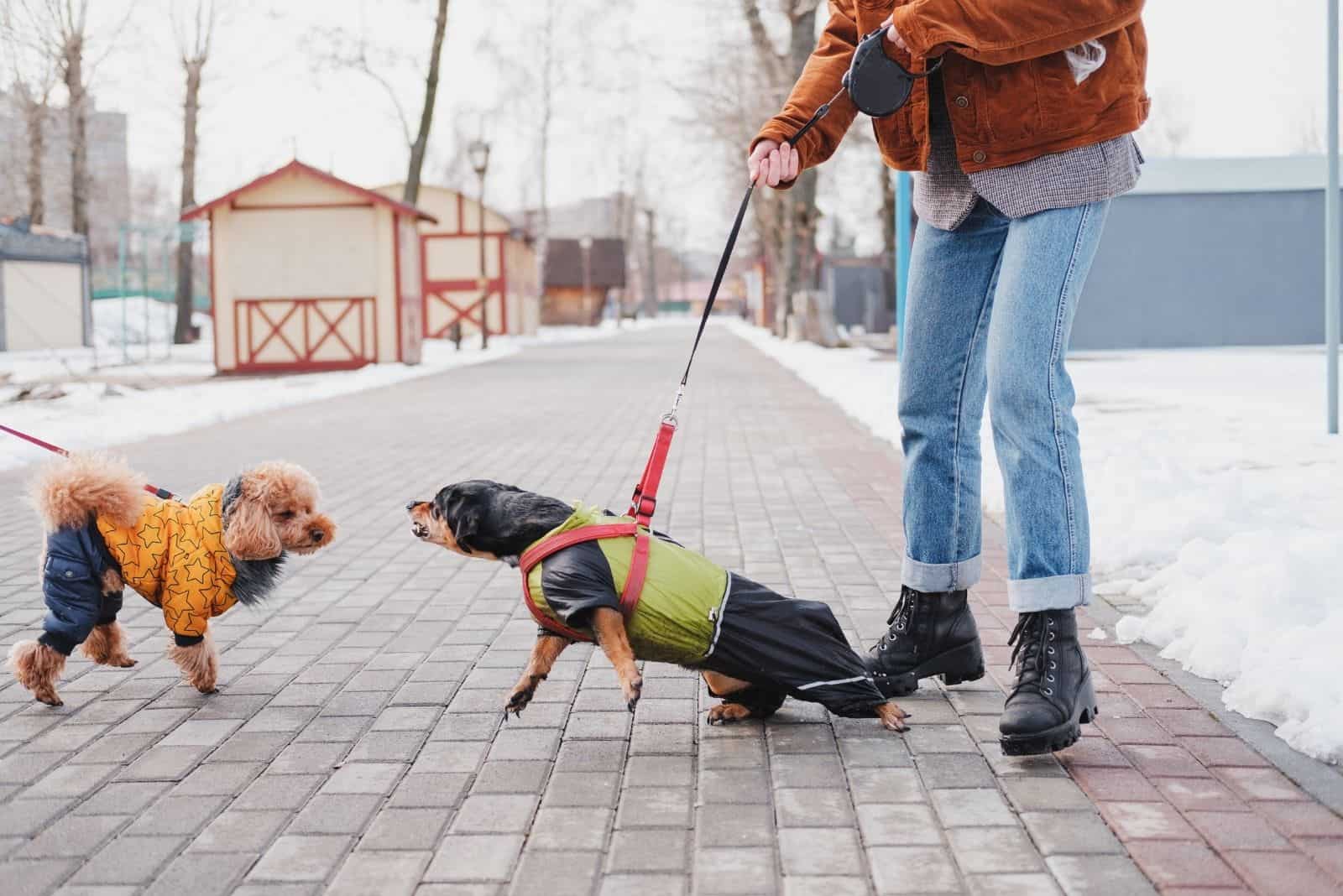
Some Dachshunds may be aggressive towards other dogs if they feel threatened. They could also growl or bark if they’re being possessive or protective of you, or trying to assert their dominance.
You can work on these behaviors with a dog trainer if you don’t know how to deal with them yourself.
Once you feel that it’s safe to do so, you could start socializing your doggy with other dogs. Remember, with proper dog training and socialization, Dachshunds should behave well around other dogs.
It’s a good idea to start with a friend’s dog (preferably a well-trained one!) that your Dachshund feels more comfortable around.
These dogs generally get along best with other small dogs or other Dachshunds. This is not to say that a Dachshund will not be fine with a large-breed dog.
If you know your Dachshund is aggressive around other dogs, keep him on a leash so as not to put other dogs at risk when on walks.
How Do You Resolve Aggressive Behaviour Issues?

The first step in stopping your Dachshund from behaving aggressively is to understand why he is doing it. Try to pay attention to what’s happening when your dog is being aggressive, and see if you can work out what the triggers are.
Once you know why your dog is being aggressive, you can start working with him to correct it.
You can correct such behavior with enough patience, time, and these helpful tips:
• Socialize your dog from a young age. Socialization with other dogs and obedience training from an early age (between 10 to 14 weeks) is essential.
• Avoid putting your Dachshund in situations that might trigger its aggression.
• Be a strong leader! Establish your dominance from an early age. Dachshunds are pack animals and they respect the leader.
Simple steps like eating before the dog does, entering the house before it does, or discouraging it from pulling the leash can help it understand who the leader is.
• Adding more exercise to your dog’s daily routine will help reduce stress and anxiety.
• Teach bite inhibition early. Puppies bite and Dachshund are no exception. However, if you teach them bite inhibition early, it’s not going to be a problem in the future.
Whenever your Dachshund bites, you should give a loud yelp and ignore it for a couple of minutes.
• Avoid games that involve chasing as this can encourage their hunting instincts and trigger aggressive behavior.
• Reward good behavior. Always train your Dachshund by using positive reinforcement – ignore bad behavior and reward good behavior with lots of praise, treats, and fuss.
• Don’t ever shout at or physically punish your Dachshund. Don’t spray him with water, use loud noise, or shock collars. This is negative and could make your Dachshund fearful and scared, potentially leading to aggressive behaviors.
• Neutering or spaying your Dachshund can sometimes help to calm them down and make it less feisty.
• Spend quality time with your dog. Excessive barking or aggressive behavior can be caused by the need for attention or boredom. Playing and cuddling up for some time everyday will keep the dog emotionally satisfied.
• Do not leave the dog alone for long periods. Dachshunds crave company, and leaving a dog alone when it is not used to it can be difficult for it to cope with.
• Be consistent – these dogs should have an element of routine and consistency in their lives. They like to know what’s coming next.
• Introduce your dog to new people properly. Don’t rush things. Let them go to investigate new people in their own time.
When dealing with an aggressive dog, you should know that aggressive dogs should never be rewarded. It will encourage hostility.
When the aggression does not subside after several attempts to eliminate it, it’s time to get professional help. Do not ever let it go to a point where your Dachshund is psychically attacking people. It may be too late.
Are Dachshunds Good Family Dogs?
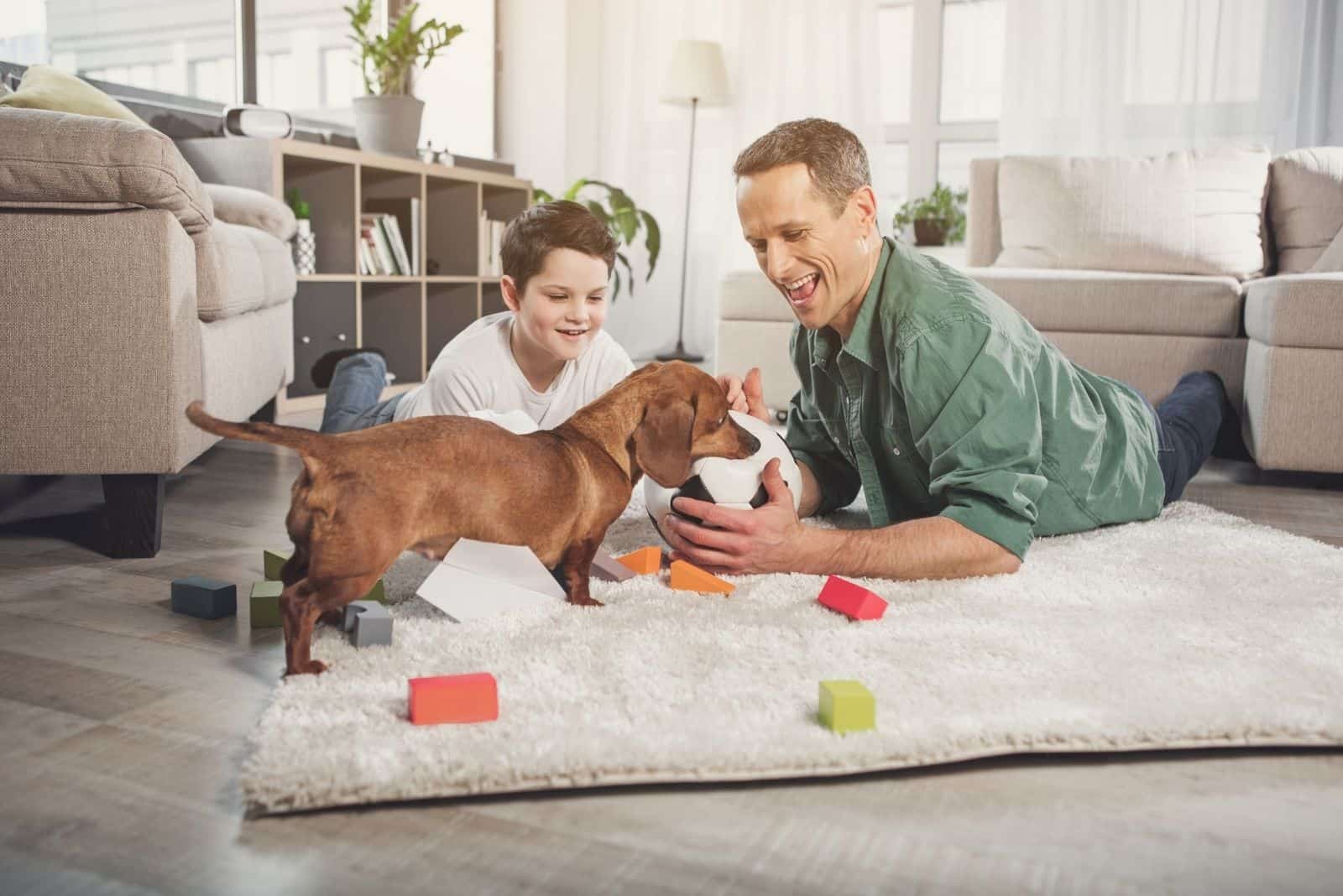
Dachshunds are a delightful addition to any family. They love to be close to you and “help” you do things like tie your shoes.
Because of their intelligence, they often have their own ideas about what the rules are when it comes to playtime – and those rules may not be the same as yours or even other breeds of dogs.
Dachshunds are a good choice for apartment dwellers and people who don’t have a backyard. They are popular with urban dwellers because of their small size and ease of care.
They generally are active indoors, and they also enjoy going on walks. Dachshunds have a reputation for being entertaining and fearless, but what they want most is to cuddle with their people.
It’s precisely this fact that makes Dachshunds wonderful protectors – not only are they willing to jump into the fray at the slightest whisper of danger, but their alertness and penchant for barking the moment their hackles are raised make them the most effective security alarms.
Read More: Dachshund Growth Chart
Finally, Are Dachshunds aggressive or not?
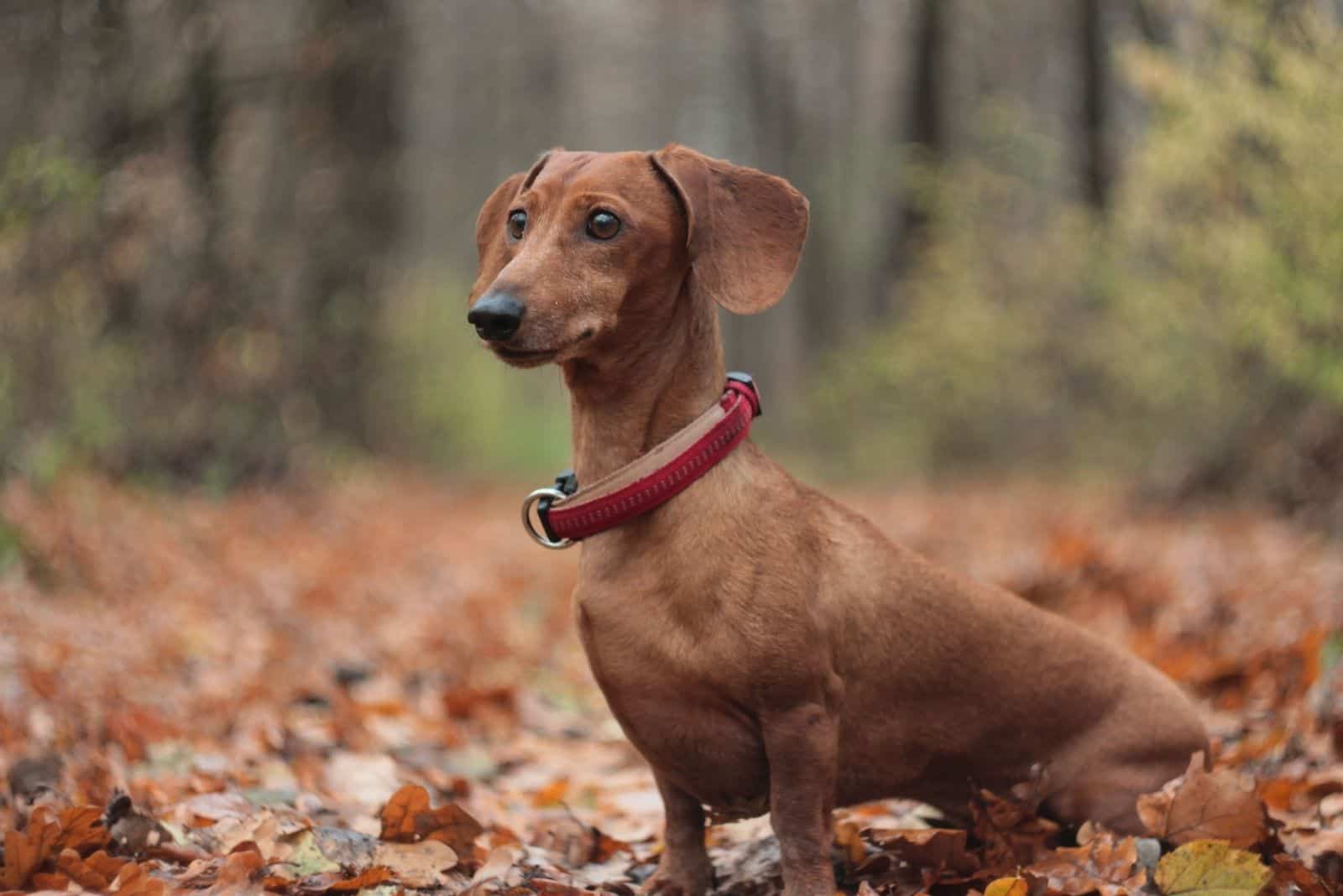
Dachshunds are generally very loving dogs that desire the companionship of people and other dogs.
They can be suspicious of strangers, and they do have a dominant personality. However, this does not necessarily mean they are aggressive.
These dogs can become aggressive when they feel scared, protective, territorial, or unwell, as well as if they’re guarding resources or if they think they’re in charge of you.
If Dachshunds are properly trained and socialized as puppies, then most are friendly and shouldn’t become aggressive.
If your Dachshund has already developed behavioral problems, don’t give up on him. Seek professional help if you don’t know how to help them.


